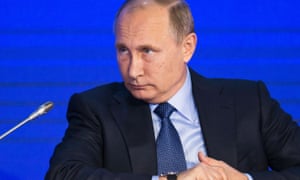Trevor Timm
19 October 2016
If the US hacks Russia for revenge, that could lead to cyberwar
 The US should attempt to de-escalate tensions by negotiating some form of international cyber treaty before this gets out of control
The US should attempt to de-escalate tensions by negotiating some form of international cyber treaty before this gets out of control
‘Why does the reaction to alleged Russian actions have to turn into a contest in who’s the bigger tough guy?’ Photograph: Alexander Zemlianichenko/AFP/Getty Images
What’s the CIA’s brilliant plan for stopping Russian cyber-attacks on the US and their alleged interference with the US election? Apparently, some in the agency want to escalate tensions between the two superpowers even more and possibly do the same thing right back to them.
NBC News reported late last week that the CIA is working up blueprints for an “unprecedented cyber covert action against Russia”, and it sounds a lot like they’re planning on leaking documents on Vladimir Putin, just as the Russians are accused of doing to the Democratic National Committee and the Clinton campaign.
NBC reported that former intelligence officials said “the agency had gathered reams of documents that could expose unsavory tactics by Russian President Vladimir Putin” and another former official said the US “should … expose the financial dealings of Putin and his associates”.
Hacking foreign governments – including political parties – is a US pastime, as even the former ex-NSA chief Michael Hayden openly admitted this week. “A foreign intelligence service getting the internal emails of a major political party in a major foreign adversary? Game on. That’s what we do,” Hayden said. He added: “By the way, I would not want to be in an American court of law and be forced to deny that I never did anything like that as director of the NSA.” (Hayden probably doesn’t want to find himself in an American court for a lot of reasons, but that’s another story.)
It’s the leaking of documents that is relatively new. The US, of course, has a long history of interfering in foreign elections as well, as Washington Post’s Ishaan Tharoor detailed last week. That’s not to excuse Russia’s alleged actions, but everyone feigning shock and horror over this needs to take a deep breath because we are rapidly spiraling towards not just a digital cold war, but perhaps something far worse.
The question a lot of people were asking when this NBC News story came out is: why was it leaked? There’s a couple of possibilities beyond the usual “the CIAcan’t keep a secret” – which they obviously can when they want to. To me, the most likely scenario is this could be the CIA’s attempt to back President Obama into a corner by putting public pressure on him to approve such an escalation in cyberwarfare.
So far, Obama has (commendably) been virtually the only official or politician in DC not to succumb to scaremongering and dramatic cold war 2.0 rhetoric when it comes to Russia. That hasn’t stopped him from criticizing Putin when he should. But he’s not pretending like Putin is some 11th-dimensional chess mastermind, pulling the strings behind every twist and turn in presidential poll numbers, like the rest of Washington.
There’s also a chance the whole thing is a ruse, where the CIA purposefully leaks a fake story for the purposes of attempting to scare Russia. But assuming the CIA plans are real, why on earth do all these national security geniuses think this is a good idea? Countless politicians have spent the last four months saying how “unprecedented” and “dangerous” Russia’s actions are, so now the magic solution is to do it back to them?
Who thinks that once the US leaks some documents back on Putin that he’ll suddenly be like ‘oh, you got me, I guess we’ll stop!’ The more likely scenario is that this half-baked idea will escalate the cyber tensions rather than act as a deterrent.
Remember, Putin reportedly thinks that the Panama Papers leak was the work of the US government (even though there’s no evidence to suggest it was) and some think the current leaks involving US politicians are his revenge. This potential CIA operation will, in his mind, only confirm his suspicions.
Putin is also much less susceptible to public pressure than US politicians are (given his alleged heavy-handed dealings with his opponents) and has increasingly attempted to implement draconian internet surveillance laws which he’ll surely use to his advantage if the US does go through with this plan.
Why does the reaction to alleged Russian actions have to turn into a contest in who’s the bigger tough guy? It’s hard to remember that just a year and a half ago, the supposed biggest cyber threat in US history was China. They were alleged to have stolen billions of dollars of intellectual property and then were accused of hacking tens of millions of people’s security review files from the US government going back decades.
Instead of saber rattling about an unprecedented wave of cyber-attacks, the US government negotiated with China, and the attacks on the US, at least on the hacking of commercial secrets, slowed down significantly. (So much so that cybersecurity defense contractors took a big hit on the stock market. Lucky for them Russia is the new bogeyman!)
Russia’s not going to stop gathering intelligence on American political parties just like the US is not going to stop on theirs, but maybe the US should attempt to actually de-escalate tensions by starting the process of negotiating some form of an international cyber treaty before this gets too out of control.
No comments:
Post a Comment